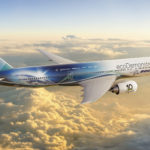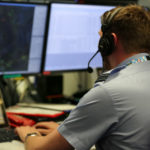Photo credit: Boeing
The cost of fuel is going to go up 70 per cent by 2050, and Chris Raymond, Boeing’s first chief sustainability officer, responsible for further advancing Boeing’s approach on environmental, social and governance (ESG) priorities, said the company has a commitment to reach net zero by then, reports Marcelle Nethersole from Seattle.
“We are also making certain our commercial aircraft will be certified to fly on 100 per cent sustainable aviation fuel (SAF) by 2030,” said Raymond.
The highest ratio of SAF to conventional jet fuel blend for commercial passenger flights today is 50 per cent.
‘We need SAF’
“If we are going to decarbonise the industry by 2050, we need SAF,” said Raymond. “We are going to have a lot of aircraft out there that we will need to renew and drop SAF in to if we are really going to decarbonise the industry. SAF is in regular use today and offers the most immediate and largest potential to reduce carbon
emissions over the next 20 to 30 years across all aviation segments.”
While Raymond, who started his career as an engineer at Boeing, said the company is “not a fuel producer, but a buyer” yet has a key role to play. “We need to make sure we bring the right parties together and then advocate some of the governments around the world,” he said.
Stakeholder trust and preference
Referring to ESG, Raymond said Boeing has a value that is around “earnings, stakeholder trust and preference”.
“I could go into a lot of things about ESG or sustainability but after 36 years in this business the one that really motivates me is this topic, which is woven through every stakeholder of our company, about earning their trust or their preference.”
Boeing has six goals for 2030 which are; Employee safety and well-being; Global aerospace safety; Equity, diversity and inclusion; Sustainable operations; Innovation and clean technology; and community engagement.
“We introduced these six areas in our company sustainability report last year and consider these six to be particularly important to our stakeholders and our industry,” said Raymond.
Defence
As Boeing has a commercial aeroplanes business, service business and a defence portfolio, which is the one people think of least when they think about ESG?
“It’s pretty clear that in commercial aviation, the whole industry has rallied around this ambition about net zero by 2050. IATA came to that conclusion a year or so ago. In the defence business, it’s not quite that aligned yet, but where I come out on the defence businesses is if governments are declaring net zero ambitions, then their
ministries of defence are certainly going to be concerned about that as well. And they always have been about things like fuel security or energy security and fuel efficiency.
“Then on the service business, it is all about helping people have more efficient operations. In the aerospace business, you could have drawn a line between fuel efficiency and fuel efficiency improvements over the years. I think it’s just the thread that runs through all three of our businesses. And that’s one of the reasons we put it
at the enterprise level.”
Electric and hydrogen solutions
Boeing is also working on electric and hydrogen solutions. “Battery-electric energy storage and green hydrogen have potential but will require new design studies, safe certification approaches, new technology developments,
platform developments, and new systemwide ground and network infrastructure to scale,” said Raymond.
Flying accounts for around 3 per cent of global CO₂ emissions and Raymond has a small anecdote for people outside the aviation industry that may need it breaking down.
“If you get in your car in New York City and drive to San Francisco, it will take you around three-four days and you will probably burn about 140 gallons, if you do the same journey via a 787, you’re there in five hours and you’ve probably consumed per capita basis 33 gallons. So, this industry has always competed on fuel efficiency,
and Boeing has made radical advances on it.”

